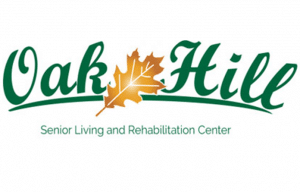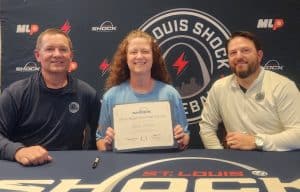Bound by blood: Family uses experience to help others

Pictured, from left, are, Gabe, Ariel, Brian and Carly Magee. Gabe and Ariel have a factor X deficiency, meaning their blood does not clot. (submitted photo)
A Waterloo family is using their difficult experiences to help others in similar situations.
The Magee family is doing that through speaking and serving with two national organizations for hemophilia, The National Hemophilia Foundation and the Hemophilia Federation Association.
“I have felt very privileged to help represent the rare bleeding disorder community at such a high level,” said Carlisa “Carly” Magee, the mother of the family. “It is awesome to be able to advocate for my children and help forge a platform for the rare bleeding disorders for the future.”
The family, led in this effort by Carly, can speak on this because both Magee children have a bleeding disorder.
Gabe, now 21, was diagnosed with a bleeding disorder within 18 hours of his birth, after he experienced substantial bleeding problems.
Then, when he was only five weeks old, Gabe, suffered a stroke that caused bleeding into his brain, causing brain damage.
Gabe’s younger sister, Ariel, was also diagnosed with a bleeding disorder, but she was born via C-section to prevent any complications.
Both Magee children have factor X deficiency, meaning their blood cannot clot.
“Any kind of outward bleeding is probably a little bit better because you can put pressure on it and do other things, but internal bleeding is much more severe,” Carly explained. “Even bruising can be rather severe.”
Factor X deficiency is an extremely rare bleeding disorder, occurring in about one in every 1 to 500,000 to 1 in a million people worldwide.
To help them raise children with this problem, the Magees attended conferences hosted by the NHF and HFA to learn more about bleeding disorders.
“When my husband and I first dove into this when my kids were much younger, we went to a lot of the national conferences because factor X deficiency is extremely rare,” Carly said. “We had never even met another person with it.”
The family also sought assistance from the Gateway Hemophilia Association in St. Louis, a nonprofit, community-based organization dedicated to advocacy, education and support of families affected by bleeding disorders.
“They’ve been a huge emotional support,” Carly said. “They helped with learning how to navigate what to do and how to advocate for yourself and how to talk to doctors. It was just unbelievable, the support network. We don’t know what we would have done without them.”
The support could only go so far, though, as for years the only treatment options available for factor X deficiency were medicines that only minimized its severity.
But many medicines would not work because they were not designed to treat factor X deficiency, but other types of bleeding disorders.
Then, in 2015, a British company created Coagadex, a medication designed specifically for people with factor x deficiency. It is injected intravenously.
Carly and Ariel, now 19, were invited to England in February 2017 to meet with scientists behind the drug.
“It was a really emotional time for us because it was wonderful to meet the people who are making it,” Carly recalled. “It was wonderful for us to tell the impact of how great the product was for us because of how much it changed our lives. Prior to the product, my daughter didn’t know how to infuse herself so she couldn’t give the product to herself. We always thought that we would have to be her nurses for her and stay very close to her.
“But now she gives herself her treatment,” she continued, “Now she went away to college, and it’s really changed her life a lot. She can be much more independent than she thought she was going to be able to be. It gave her the confidence and everything.”
After that positive experience and years of experience, the Magee family is sharing their story and wisdom with others. That often happens in speeches at the NHF and HFA.
In her speeches, Carlisa said she often focuses on “trying to be optimistic and sharing Ariel’s story a little bit about how you can become independent and focus on the good in life.”
She also serves on the planning committee for the NHF.
Carly said a large part of the work she does is to raise awareness of bleeding disorders. She said increased awareness would have profound results.
“The support and understanding would be great,” she said. “There are many times where we just have to pick up and leave a situation. An understanding from the outside looking in on our behaviors would be great. Usually, it’s like they question us or something. A deeper knowledge would be wonderful, especially from doctors.”
To learn more about bleeding disorders and how to help people with that problem in the area, go to gatewayhemophilia.org.
Read the rest of the story in the January 2, 2019, newspaper.
If you don’t already receive the Republic-Times newspaper in your mailbox, click here or call 939-3814 to subscribe.
Or consider joining a growing number of readers who receive their news electronically. To view a free demo of the online R-T, click here.
Subscribe to the full-color online edition of the Republic-Times, which is delivered to your inbox every Wednesday by lunchtime and can be accessed anywhere, from any electronic device, for just $25 a year, by clicking here or calling 939-3814.






